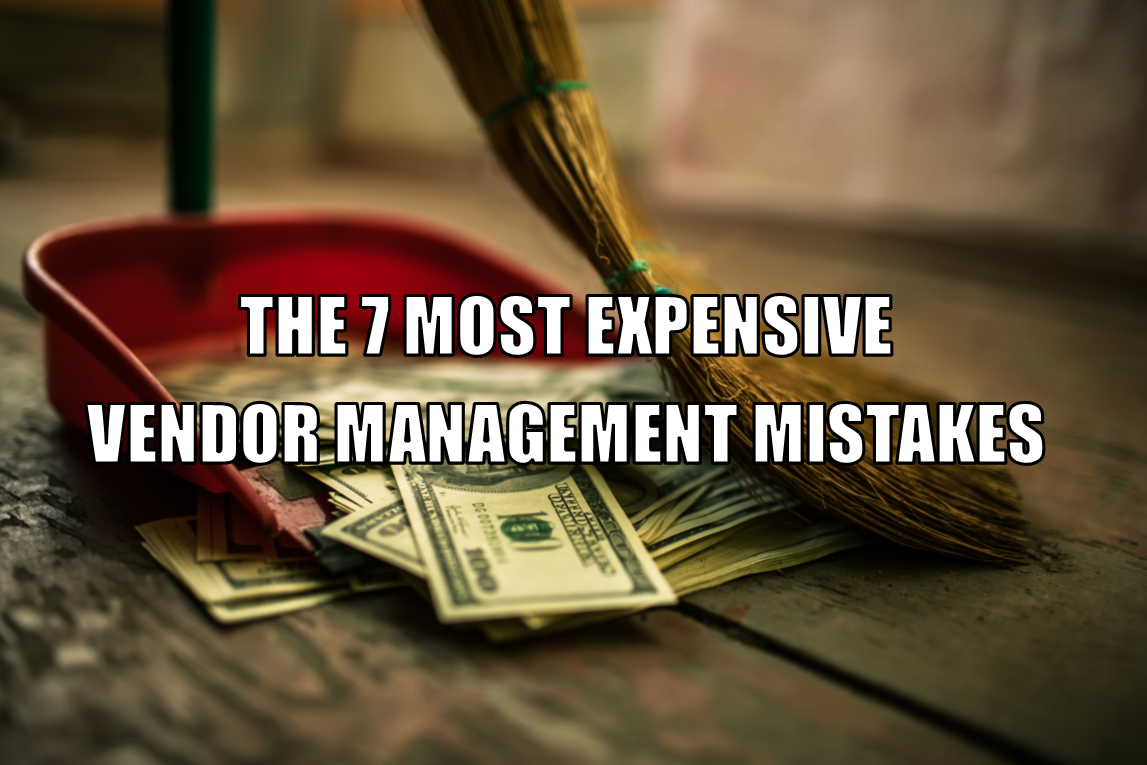
Financial institutions are full of smart professionals—straight shooters who know how to judge character and structure a deal. But even the wisest among them overlook savings opportunities when dealing with third-party vendors.
Pressed for time and facing salespeople determined to sell their services at a premium, these otherwise successful professionals can find themselves at a disadvantage and end up paying for it.
From the insidious to the emotional to the downright dangerous, here are the most expensive mistakes banks and credit unions make with their vendors—and how to prevent them.
1. Not bidding out every contract. It’s a headache and a hassle to bid out every contract—but it gives you the pricing, terms and market intelligence you need to negotiate a fair deal.
Begin the bid process within 24 months of your current contract’s expiration to maximize leverage and never tell a vendor that you aren’t entertaining other options. You will lose every bit of leverage you have.
2. Refusing to consider other vendors. Don’t just collect RFPs—consider the possibility that another vendor might be a better fit. Bank and credit union executives have a fiduciary duty to the board and shareholders to run operations as efficiently as possible. While most of our clients stay with their existing vendor, they take the time to ask if a new vendor might help them achieve their goals in a changing marketplace.
3. RFP mismanagement. Are you asking the right questions of third- party vendors? My experience suggests you aren’t. This is the biggest mistake I see financial institutions make, and they have no idea they are doing it.
It starts off with the best intentions. An institution brainstorms a long list of questions it thinks is relevant and asks for pricing. Yet the vast majority of institutions won’t get what they need to accurately compare pricing and terms because they are asking the wrong questions.
For example, don’t just ask vendors for pricing. Give them the pricing model nomenclature you want to use. Avoid surprises by making sure the RFP requires vendors to itemize what they will and won’t charge for.
4. Neglecting the auto renew cycle. It’s the most common mistake I see. A financial institution doesn’t have a contract management system in place or the person who first negotiated the contract loses track of deadlines and suddenly a contract is renewed for two or more years. I’ve even seen auto renews for the full length of the original contract—as much as 7 years—if there isn’t 180 days’ notice. By the end of the renewed contract, the institution would have pricing that is 14 years old!
Avoid this problem by putting contract management policies and procedures in place, using software or by hiring a third party to stay on top of contract expiration dates. Contractually limit auto renews to 12 months and be sure to cap fee increases.
5. Failing to negotiate deconversion costs. You’re focused on joining up with a new vendor, not thinking about the day the relationship ends. Yet some day you may want to leave your vendor. If the cost is left up in the air, the charges will be at the discretion of a potentially punitive vendor.
Address this head on by talking to your vendor about deconversion costs during contract discussions. Vendors are very open to negotiating this fee at the beginning of a relationship and are often willing to cap it at a fixed amount since it won’t cost them anything upfront.
6. Growing too emotionally invested in a vendor. Sales representatives do an incredible job building relationships. They take you and your staff to lunch or the golf course. They remember your birthday. They ask about your spouse and kids. When it comes time to renegotiate your contract, many bankers are uncomfortable putting the contract out to bid because they don’t want to hurt the rep’s feelings or worry that they won’t get the same level of service.
That’s exactly what your vendors want you to think.
Vendors don’t want you to go through the bidding process because they don’t want you to have competitive market intelligence—but they’ll easily forgive you. That’s because vendors want to retain you as a client. They aren’t going to dump you just because you considered other options.
Avoid the drama and perceived hurt feelings by setting policies and procedures regarding what gifts employees can receive from vendors. Set policies requiring that major vendor contracts are put out to bid so staff can blame the policy for the RFPs. Let someone who can keep emotions out of the decision handle negotiations.
7. Miscalculating growth. Too often bankers negotiate long-term contracts without taking the time to forecast where the institution will be in three, five or seven years—or they midjudge how much the institution will grow. If a contract is designed around incorrect assumptions, it can blow the budget or prevent the institution from reaching its goals. I often see clients outgrow contracts in just three years.
Contracts should be designed with growth parameters that give an institution the flexibility to accommodate growth. If you’re not sure how much flexibility you can push for, find someone with the experience to know.
These are just seven of the most expensive third-party vendor management mistakes, but there are many other ways to get tripped up. Make sure you have the right policies, procedures and knowledge in place to ensure you’re getting the best value and terms for your institution.
“For more on this topic, download our report, Level the Playing Field When Negotiating Long-Term Vendor Contracts.”
Patrick Goodwin is President of Strategic Resource Management, Inc. (SRM) and brings more than 15 years of experience in cost reduction and revenue enhancement strategies, corporate negotiations, project management, and operations to financial institutions. You can contact Patrick at pgoodwin@srmcorp.com or by calling (901) 681-0204.


